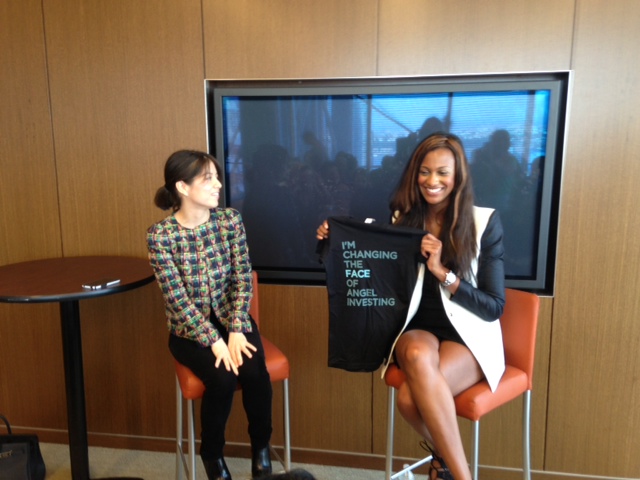When women work for free, part 2
/September 9, 2014
"The most important thing is to look at yourself and ask how comfortable are you charging? I work with a lot of women and they’re not comfortable." - Kathy Caprino
 Photo 'Money Queen' by @Doug88888 via Creative Commons license: http://bit.ly/1lQ6qzF
Photo 'Money Queen' by @Doug88888 via Creative Commons license: http://bit.ly/1lQ6qzF
A year ago I wrote a post called When Women Work for Free. I did it because a) as a writer I find I’m often expected to write for free, but b) as an entrepreneur, I’ve begun to experience what I think of as ‘expectation creep’. This has been happening more this year, thus the follow-up post.
I’ll occasionally hear from someone who asks if they can meet for coffee or have a phone call to ‘pick my brain’ about whatever it is they want to discuss. Sometimes I’m asked to speak (for free). Now it’s flattering to be asked, and the request usually comes because someone has heard The Broad Experience or they’ve heard me talking about women and work on the radio. I’m happy and grateful they value the show and the conversations we have there. But I find it awkward to have to explain to my correspondents that I need to be paid for my time. This is how I earn a living. I admit I’ve sometimes felt frustrated and resentful that people don’t seem to get that I can’t give away my time for free.
But maybe I’m wrong to feel that way.
The question of how much of yourself to offer out of generosity is more fraught for women than it is for men. Women are expected to be nice, giving, and helpful, and a lot of us find it tough turning people down. As one recent interviewee with her own business told me, “People expect women to do things for free.”
If you’re in this position, read on.
It was this Forbes post – No, You Can’t Pick My Brain, It Costs Too Much - that got me thinking deeply about this. But is the writer, Adrienne Graham, too ungenerous - what Adam Grant would call a 'taker' rather than a 'giver'? Or is she a sensible guardian of her time and money?
I recently asked a few businesswomen I know how they deal with these requests.
Anne Libby is a management consultant in New York. She is not as strict as the author of the ‘No, You Can’t Pick My Brain’ post. Still, Anne told me she’s given up writing (free) guest posts for various sites (this is something those of us who are ‘building our brands’ are often told is a good thing – it’s meant to bring us more audience). Anne says in her case she’s never got a new client from doing that. But here’s what she does: Friday is usually a day when she does not schedule clients. Instead she uses the day for admin, chasing payments, all the extra stuff sole proprietors have to deal with. So when she gets a ‘can I pick your brain over coffee?’ request she says, ‘Sure – here’s a date three Fridays from now, let’s meet at this coffee shop at this time for half an hour.’ That coffee shop happens to be just blocks from her place. Having the meeting take place on her terms works for her. And she says it weeds out a lot of people who aren’t that serious.
Dorie Clark is a writer, speaker and professor whose most recent book, Reinventing You, has generated a lot of interest (and requests). She rarely does coffee. She is rigorous about protecting her time and replies to most requests with a polite, ‘Sorry, I’m swamped’ boilerplate response.
“If there's a reason I want to build a relationship with the person (they have something they can offer me or seem interesting), then I'll do it,” she says. “But otherwise I'll refer them to articles I've written, or if I want to be semi-nice, I will tell them I don't have time to meet but can answer a specific question.”
Career coach and Forbes blogger Kathy Caprino has thought about this a lot. As a women’s coach with a large following from all her writing on careers, she is inundated with requests to look over people’s resumes (for free) or meet for coffee to give advice. It used to really piss her off, but one day she realized, look, people have no idea what my business model is: they don’t realize this is how I earn my living. She no longer gets mad but instead uses a boilerplate response and points people to the free resources she does offer on her website, explaining that offering them true service requires knowing much more about them, and that that involves a coaching session.
She agrees there’s a societal expectation for women to give of their time for nothing, but she says we can’t use that as an excuse to mope about this issue.
“The most important thing isn’t to blame society and culture,” Kathy says. “The most important thing is to look at yourself and ask how comfortable are you charging? I work with a lot of women and they’re not comfortable.”
This, she says, is the crux of this issue for many women, myself included. Many of us have set up businesses, such as consulting or coaching, where helping people is part of the deal. Even we are ambivalent about what our value is and what we should charge. Kathy says anyone setting up a service business needs to go through a process to arrive at what they should charge, and be comfortable with it.
“First you have to do exhaustive competitive research,” she says. “What do others charge – what are their packages, services, how do they deliver, what do they deliver? Then look at yourself – what am I bringing, how am I unique? What are the outcomes I can guarantee delivering?” (There are some good tips on how to revamp your attitude to charging in this post of hers from earlier this year.)
Then, she says, “You start setting what those prices are and you start offering that.”
She says the key is to learn to be comfortable with the fact that this is what you are worth. Sure, be generous to the extent that you want given limits on your time. But don’t forget you are running a business and you need to be paid.
“You’ve got to set the boundaries and live with it, that’s really what it’s about.”
What are your experiences of giving your time? How strongly do you feel about being generous versus being paid? I'd love to hear from you in the comments below.
